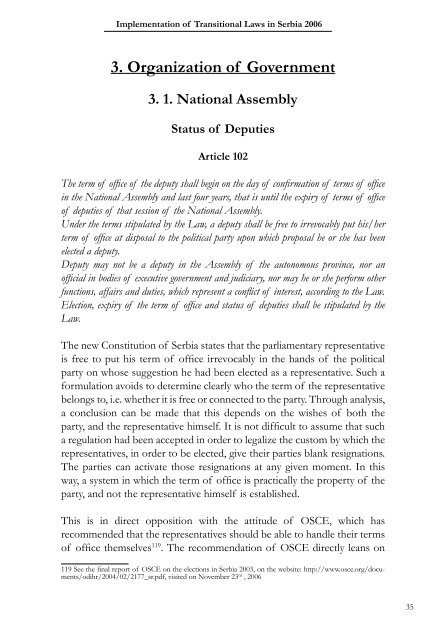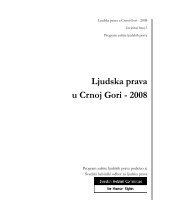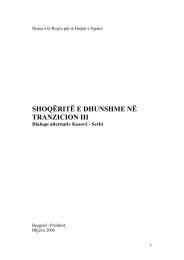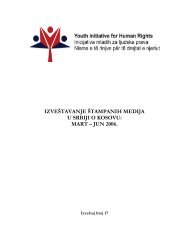Implementation of Transitional Laws in Serbia 2006
Implementation of Transitional Laws in Serbia 2006 - Archive
Implementation of Transitional Laws in Serbia 2006 - Archive
- No tags were found...
You also want an ePaper? Increase the reach of your titles
YUMPU automatically turns print PDFs into web optimized ePapers that Google loves.
<strong>Implementation</strong> <strong>of</strong> <strong>Transitional</strong> <strong>Laws</strong> <strong>in</strong> <strong>Serbia</strong> <strong>2006</strong>3. Organization <strong>of</strong> Government3. 1. National AssemblyStatus <strong>of</strong> DeputiesArticle 102The term <strong>of</strong> <strong>of</strong>fice <strong>of</strong> the deputy shall beg<strong>in</strong> on the day <strong>of</strong> confirmation <strong>of</strong> terms <strong>of</strong> <strong>of</strong>fice<strong>in</strong> the National Assembly and last four years, that is until the expiry <strong>of</strong> terms <strong>of</strong> <strong>of</strong>fice<strong>of</strong> deputies <strong>of</strong> that session <strong>of</strong> the National Assembly.Under the terms stipulated by the Law, a deputy shall be free to irrevocably put his/herterm <strong>of</strong> <strong>of</strong>fice at disposal to the political party upon which proposal he or she has beenelected a deputy.Deputy may not be a deputy <strong>in</strong> the Assembly <strong>of</strong> the autonomous prov<strong>in</strong>ce, nor an<strong>of</strong>ficial <strong>in</strong> bodies <strong>of</strong> executive government and judiciary, nor may he or she perform otherfunctions, affairs and duties, which represent a conflict <strong>of</strong> <strong>in</strong>terest, accord<strong>in</strong>g to the Law.Election, expiry <strong>of</strong> the term <strong>of</strong> <strong>of</strong>fice and status <strong>of</strong> deputies shall be stipulated by theLaw.The new Constitution <strong>of</strong> <strong>Serbia</strong> states that the parliamentary representativeis free to put his term <strong>of</strong> <strong>of</strong>fice irrevocably <strong>in</strong> the hands <strong>of</strong> the politicalparty on whose suggestion he had been elected as a representative. Such aformulation avoids to determ<strong>in</strong>e clearly who the term <strong>of</strong> the representativebelongs to, i.e. whether it is free or connected to the party. Through analysis,a conclusion can be made that this depends on the wishes <strong>of</strong> both theparty, and the representative himself. It is not difficult to assume that sucha regulation had been accepted <strong>in</strong> order to legalize the custom by which therepresentatives, <strong>in</strong> order to be elected, give their parties blank resignations.The parties can activate those resignations at any given moment. In thisway, a system <strong>in</strong> which the term <strong>of</strong> <strong>of</strong>fice is practically the property <strong>of</strong> theparty, and not the representative himself is established.This is <strong>in</strong> direct opposition with the attitude <strong>of</strong> OSCE, which hasrecommended that the representatives should be able to handle their terms<strong>of</strong> <strong>of</strong>fice themselves 119 . The recommendation <strong>of</strong> OSCE directly leans on119 See the f<strong>in</strong>al report <strong>of</strong> OSCE on the elections <strong>in</strong> <strong>Serbia</strong> 2003, on the website: http://www.osce.org/documents/odihr/2004/02/2177_sr.pdf,visited on November 23 rd , <strong>2006</strong>35











